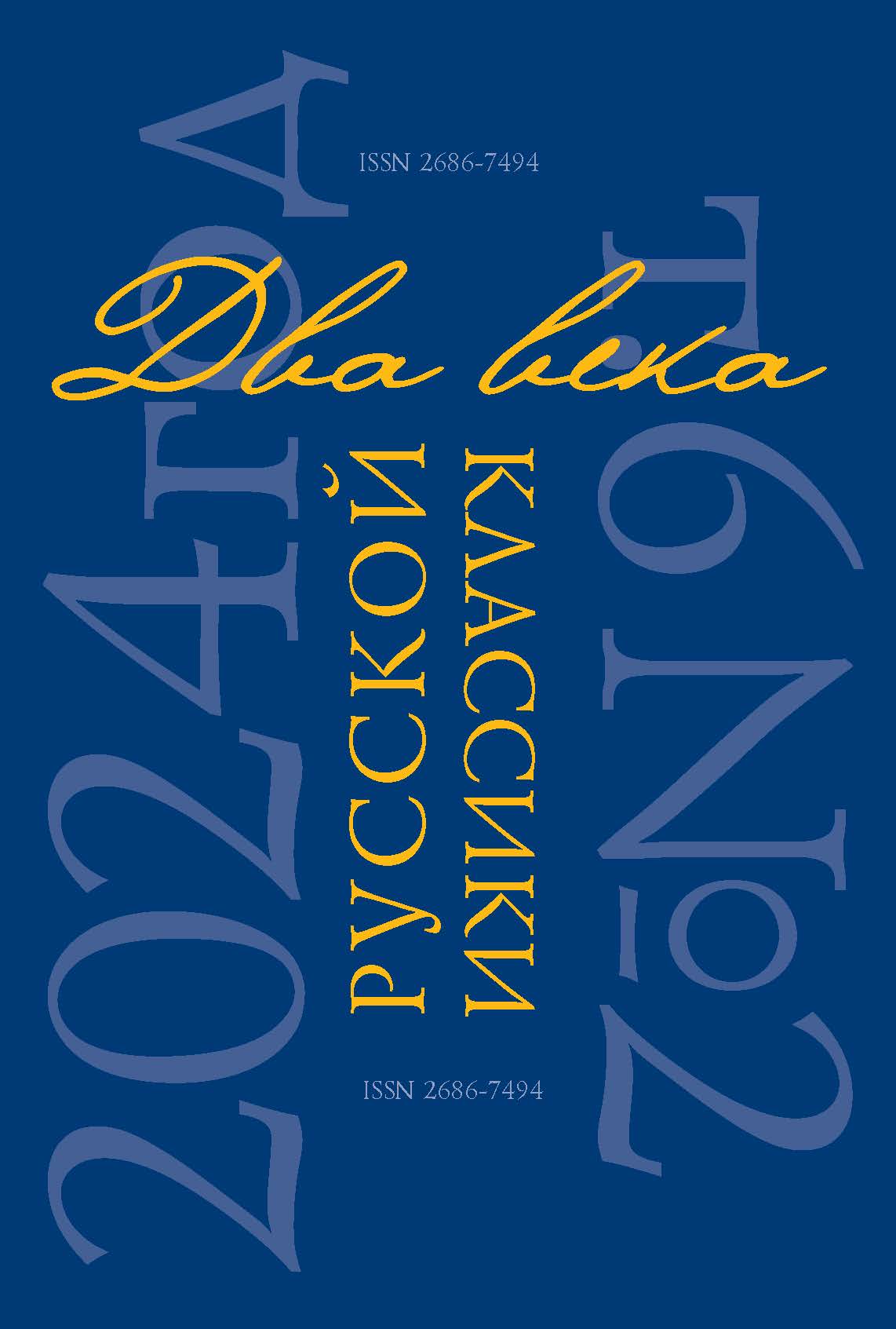Abstract:
The translation of Nikolay Gogol’s legacy into foreign languages is traditionally associated with a number of difficulties, ignoring which leads to a distortion of the idiostyle of the classic. The article defines the main reason for the distance between Nikolay Gogol’s works and their foreign transcriptions. It lies in the translator’s indistinguishability of those original writer’s concepts, which are built on the basis of national-patriotic constants and supplemented with semantic stresses that are priority for Gogol the Christian. The argumentation of the proposed thesis is carried out in the article in stages. The first stage is connected with the reconstruction of the “core” of Gogol’s concept “Bogatyrstvo” based on the material of “Selected Passages from Correspondence with Friends” and “Dead Souls.” The second stage is the semantic volume of the “core” of Gogol’s concept “Bogatyrstvo” and the ways of its exposition in foreign translations. It turns out that the reduction of the essence of the author’s concept of “Bogatyrstvo” proposed by the majority of translators to the culturally neutral category of “heroism” is irrational and superficial. The author of the article proposes transliteration of Nikolay Gogol’s conceptosphere units as a solution to the problem of its untranslatability.
References
Vinogradov, I. A. “Samaia patrioticheskaia kniga nashei slovesnosti (ʽVybrannye mesta iz perepiski s druz’iami Nikolaia Gogolia’)” [“The Most Patriotic Book of Our Literature (ʽSelected Passages from Correspondence with Friends’ by Nikolay Gogol’)”]. Literaturnyi fakt, no. 5, 2017, pp. 416–421. https://doi.org/10.22455/2541-8297-2017-5-416-426 (In Russ.)
Volodina, N. V. Kontsepty, universalii, stereotipy v sfere literaturovedeniia [Concepts, Universals, Stereotypes in the Field of Literary Criticism]. Moscow, Flinta, Nauka Publ., 2011. 256 p. (In Russ.)
Vorkachev, S. G. “Kul’turnye kontsepty i perevod: makarizmy v tekste Evangeliia” [“Cultural Concepts and Translation: Makarisms in the Text of the Gospel”]. Vestnik Moskovskogo gosudarstvennogo oblastnogo universiteta, no. 4, 2003, pp. 88–93. (In Russ.)
Voropaev, V. A. N. V. Gogol’: zhizn i tvorchestvo [Gogol: Life and Works]. Moscow, Moscow State University Publ., 1998. 128 p. (In Russ.)
Voropaev, V. A. “ʽTvorit’ bez liubvi nel’zia.’ Gogol za chteniem Biblii” [“ʽYou Can’t Create without Love.’ Gogol Reading the Bible”]. Teoriia Traditsii: khristianstvo i russkaia slovesnost’ [Theory of Tradition: Christianity and Russian Literature]. Izhevsk, Udmurt State University Publ., 2009, pp. 120–134. (In Russ.)
Goncharov, S. A. “Apostol Pavel i Gogol’” [“The Apostle Paul and Gogol”]. IX Musica antique europae orientalis [IX Musica antique europae orientalis], vol. 2. Bydgoszcz, Państwowe Wydawn. Naukowe Publ., 1991, pp. 181−193. (In Russ.)
Goncharov, S. A. Tvorchestvo Gogolia v religiozno-misticheskom kontekste [Gogol’s Works in a Religious and Mystical Context]. St. Petersburg, The Herzen State Pedagogical University of Russia Publ., 1997. 340 p. (In Russ.)
Zusman, V. G. “Kontsept v kulturologicheskom aspekte” [“The Concept in the Cultural Aspect”]. Mezhkul’turnaia kommunikatsiia [Intercultural Communication]. Nizhny Novgorod, Dekom Publ., 2001, pp. 3–14. (In Russ.)
Ziabreva, G. A., and S. V. Kapustina. “Kontsept v literaturovedcheskom diskurse (na materiale tvorchestva N. V. Gogolia i F. M. Dostoevskogo)” [“Concept in Literary Discourse (Based on the Works of N. V. Gogol and F. M. Dostoevsky)”]. Kontsept: grani ponyatiia v sovremennoi nauke [Concept: Facets of the Concept in Modern Science]. Noginsk, Analitika Rodis Publ., 2015, pp. 4–45. (In Russ.)
Kapustina, S. V. “Fenomen bogatyrstva v traktovke N. V. Gogolia I F. M. Dostoevskogo” [“The Phenomenon Bogatyrstvo in N. V. Gogol’s and F. M. Dostoevsky’s Interpretation”]. Problemy istoricheskoi poetiki, vol. 12, 2014, pp. 264–270. (In Russ.)
Kapustina, S. V. “Kontsept ʽbesporiadok’ v romane F. M. Dostoevskogo ʽPodrostok’.” [“The Concept of ʽBesporyadok’ (ʽDisorder’) in Dostoyevsky’s Novel ʽThe Adolescent’.”]. Dostoevskii i mirovaia kul’tura. Filologicheskii zhurnal, no. 3 (15), 2021, pp. 76–97. https://doi.org/10.22455/2541-7894-2021-3-76-97 (In Russ.)
Kapustina, S. V. “Pravoslavnyi kardiognozis russkogo naroda kak osnova bogatyrstva (na materiale ʽDnevnika pisatelia’ F. M. Dostoevskogo)” [“Orthodox Cardiognosis of the Russian People as the Basis of Heroism (Bogatyrstvo) (Based on the ʽDiary of a Writer’ by F. M. Dostoevsky)”]. Vestnik Tomskogo gosudarstvennogo universiteta. Kul’turologiia i iskusstvovedenie, no. 46, 2022a, pp. 44–52. https://doi.org/10.17223/22220836/46/4 (In Russ.)
Kapustina, S. V. “Gorod kak eksplikant bazisnykh kontseptov romana F. M. Dostoevskogo ʽPodrostok’.” [“City as an Explicant of the Key Concepts in Dostoyevsky’s ʽThe Adolescent’.”]. Slovo.ru: baltiiskii aktsent, vol. 13, no. 4, 2022b, pp. 124–141. https://doi.org/10.5922/2225-5346-2022-4-9 (In Russ.)
Karasik, V. I., and I. A. Sternin. Antologiia kontseptov [Anthology of Concepts], vol. 1. Volgograd, Paradigma Publ., 2005. 352 p. (In Russ.)
Mal’tseva, I. G. “Obuchenie khudozhestvennomu perevodu: metodika ustanovleniia adekvatnosti” [“Teaching Literary Translation: A Methodology for Establishing Adequacy”]. Pedagogicheskoe obrazovanie v Rossii, no. 1, 2012, pp. 3–6. (In Russ.)
Mironov, A. S. Epos russkikh: aktualizatsiia [The Epic of the Russians: Actualization]. Moscow, Heritage Institute Publ., 2020. 320 p. (In Russ.)
Nedzvetskii, V. A. “ʽMertvye dushi’ N. V. Gogolia kak khudozhestvennaia propoved’” [“ʽDead Souls’ by N. V. Gogol as an Artistic Sermon”]. Russkaia literatura XIX veka i khristianstvo [Russian Literature of the 19th Century and Christianity]. Moscow, Moscow State University Publ., 1997, pp. 149–158. (In Russ.)
Popova, Z. D., and I. A. Sternin. Poniatie “kontsept” v lingvisticheskikh issledovaniiakh [The Term “Concept” in Linguistic Research]. Voronezh, Voronezh State University Publ., 2000. 301 p. (In Russ.)
Popova, Z. D., and I. A. Sternin. Ocherki po kognitivnoi lingvistike [Essays on Cognitive Linguistics]. Voronezh, Istoki Publ., 2001. 192 p. (In Russ.)
Popova, Z. D., and I. A. Sternin. “Kontsepty i mezhkul’turnaia kommunikatsiia” [“Concepts and Intercultural Communication”]. Vestnik Voronezhskogo gosudarstvennogo universiteta. Seriia: Lingvistika i mezhkul’turnaia kommunikatsiia, no. 1, 2002, pp. 117–121. (In Russ.)
Stepanov, Iu. S. Konstanty: Slovar’ russkoi kul’tury [Constants: Dictionary of Russian Culture]. Moscow, Academicheskii proekt Publ., 2001. 989 p. (In Russ.)
Stepanov, Iu. S. Kontsepty. Tonkaia plenka tsivilizatsii [Concepts. A Thin Layer of Civilization]. Moscow, Iazyki slavianskikh kul’tur Publ., 2007. 248 p. (In Russ.)
Tarasova, E. K. “Ideal dukhovnogo zdorov’ia v tvorchestve N. V. Gogolia (po materialam nemetskoiazychnykh issledovanii)” [“The Ideal of Spiritual Health in the Works of N. V. Gogol (Based on the Materials of German-language Studies)”]. Znanie. Ponimanie. Umenie, no. 5, 2009, p. 13. (In Russ.)
Shafikov, S. G. “Russkii kontsept i problema perevoda s russkogo iazyka na inostrannyi” [“Russian Concept and the Problem of Translation from Russian into a Foreign Language”]. Vestnik Akademii nauk Respubliki Bashkortostan, no. 1 (77), 2015, pp. 60–68. (In Russ.)
Keil, Rolf-Ditrich. “Gogol und Paulus.” Die Welt der Slawen, Jg. 31. Munchen, Verlag Otto Sagner, 1986, pp. 86–99. (In German)
Hapgood, Isabel Florence. “Tchitchikoff’s journeys, or Dead Souls” by Nikolay Gogol. New York, Thomas Y. Crowell & Co, 1886. 282 p. (In English)
Hogarth, David James. “Dead souls” by Nikolay Gogol. London, Toronto, J. M. Dent, 1842. 340 p. (In English)
Pevear, Richard, and Larissa Volkhonsky. “Dead Souls”. New York, Pantheon Books, 1996. 423 p. (In English)
Zeldin, Jesse. “Selected Passages from Correspondence with Friends” by N. V. Gogol. Nashville, Vanderbilt University Press, 1969. 271 p. (In English)









